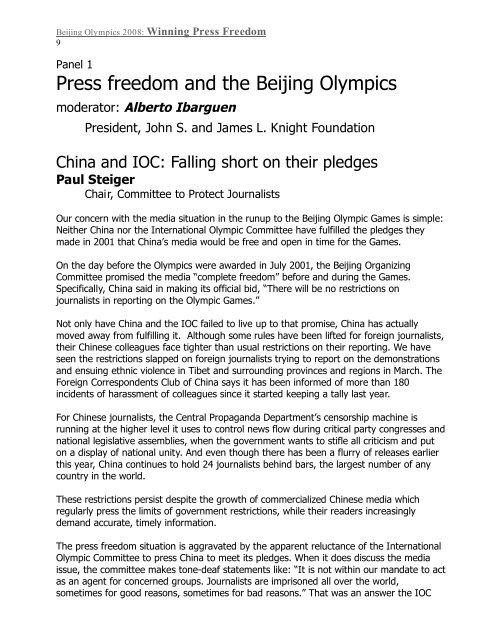Beijing Olympics 2008: Winning Press Freedom - World Press ...
Beijing Olympics 2008: Winning Press Freedom - World Press ...
Beijing Olympics 2008: Winning Press Freedom - World Press ...
Create successful ePaper yourself
Turn your PDF publications into a flip-book with our unique Google optimized e-Paper software.
<strong>Beijing</strong> <strong>Olympics</strong> <strong>2008</strong>: <strong>Winning</strong> <strong>Press</strong> <strong>Freedom</strong><br />
9<br />
Panel 1<br />
<strong>Press</strong> freedom and the <strong>Beijing</strong> <strong>Olympics</strong><br />
moderator: Alberto Ibarguen<br />
President, John S. and James L. Knight Foundation<br />
China and IOC: Falling short on their pledges<br />
Paul Steiger<br />
Chair, Committee to Protect Journalists<br />
Our concern with the media situation in the runup to the <strong>Beijing</strong> Olympic Games is simple:<br />
Neither China nor the International Olympic Committee have fulfilled the pledges they<br />
made in 2001 that China’s media would be free and open in time for the Games.<br />
On the day before the <strong>Olympics</strong> were awarded in July 2001, the <strong>Beijing</strong> Organizing<br />
Committee promised the media “complete freedom” before and during the Games.<br />
Specifically, China said in making its official bid, “There will be no restrictions on<br />
journalists in reporting on the Olympic Games.”<br />
Not only have China and the IOC failed to live up to that promise, China has actually<br />
moved away from fulfilling it. Although some rules have been lifted for foreign journalists,<br />
their Chinese colleagues face tighter than usual restrictions on their reporting. We have<br />
seen the restrictions slapped on foreign journalists trying to report on the demonstrations<br />
and ensuing ethnic violence in Tibet and surrounding provinces and regions in March. The<br />
Foreign Correspondents Club of China says it has been informed of more than 180<br />
incidents of harassment of colleagues since it started keeping a tally last year.<br />
For Chinese journalists, the Central Propaganda Department’s censorship machine is<br />
running at the higher level it uses to control news flow during critical party congresses and<br />
national legislative assemblies, when the government wants to stifle all criticism and put<br />
on a display of national unity. And even though there has been a flurry of releases earlier<br />
this year, China continues to hold 24 journalists behind bars, the largest number of any<br />
country in the world.<br />
These restrictions persist despite the growth of commercialized Chinese media which<br />
regularly press the limits of government restrictions, while their readers increasingly<br />
demand accurate, timely information.<br />
The press freedom situation is aggravated by the apparent reluctance of the International<br />
Olympic Committee to press China to meet its pledges. When it does discuss the media<br />
issue, the committee makes tone-deaf statements like: “It is not within our mandate to act<br />
as an agent for concerned groups. Journalists are imprisoned all over the world,<br />
sometimes for good reasons, sometimes for bad reasons.” That was an answer the IOC





